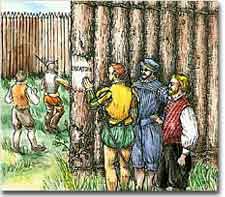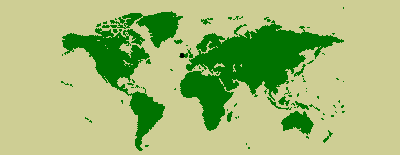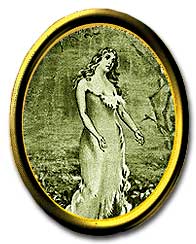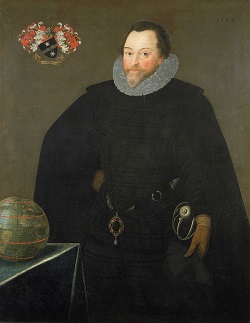2a. Early Ventures Fail

When John White returned to Roanoke Island in 1590, the colonists he hoped to find had vanished. Their homes were gone, and the only clue was the word "CROATOAN."
What kind of investment was Queen Elizabeth making? As a finanical backer of English sea captain Francis Drake, she supported a buccaneer who found it easier to plunder the gold of others than mine it himself.
This philosophy of plunder motivated the sea dogs of Queen Elizabeth's time. Making a business of raiding Spanish ships, John Hawkins and Francis Drake gained riches for themselves and their investors.
Once, after raiding ports in New Spain, Drake was faced with a difficult dilemma. Because the Spanish fleet would surely destroy him if he attempted a conventional return, he proceeded to circumnavigate the globe in his flight. Upon Drake's safe arrival in England, the Spanish demanded his arrest.
New Spain
New Spain refers to Spanish-controlled territories in North America. These territories included what would become the southwest United States, Florida, Mexico, Central America north of Panama, some West Indian islands, and the islands of the Philippines.
The Knight Stuff

Sir Francis Drake was the first Englishman to circumnavigate the world. Connect the dots to trace his routes.
Of course, Elizabeth refused to comply with Spain's demands. She was one of Drake's investors. Instead, she knighted him on the deck of his treasure-laden ship. In the process, Drake became the first to sail around the world since Ferdinand Magellan's voyage. He completed perhaps the longest escape route in the history of the world.

The first English baby born in the new colony, Virginia Dare, disappeared along with the rest of the "lost colony."
As tensions flared between England and Spain, it soon became sensible for England to establish permanent settlements in the New World to rival the Spanish. If nothing more, they could serve as bases from which to raid Spanish ships.
Early Attempts at Colonizing
The first to attempt such a venture was Humphrey Gilbert. Gilbert had already made a name for himself as a colonizer. Throughout the 1560s and 1570s, he ruthlessly put down Irish rebellions. Due to his fervor for the Church of England, he stopped short of nothing — torture, starvation, or beheading — in the name of the queen. He took this philosophy and loyalty to Newfoundland with the goal of establishing the first permanent English settlement in the New World.

Sir Francis Drake wearing the Drake Jewel or Drake Pendant at his waist
Marcus Gheeraerts the Younger, 1591
In 1583, he rushed ashore and proudly claimed the land for his queen — despite the fact that fishermen from other countries had lived there for decades. His ship was lost at sea on his return home.
Roanoke
Sir Walter Raleigh's expedition to Roanoke did not fare much better. In 1585, Raleigh's men settled on the small island off the coast of modern-day North Carolina. Relations with the Native American inhabitants were peaceful at first, but as the colonists' supplies dwindled, amity dwindled too. The colonists left in 1586 after beheading the local Indian chief, Wingina.
Raleigh arranged for Governor John White and a group of families to return to live in peace with the natives in 1587. Violence, however, is not easily forgotten. Within one month, hostilities resumed, and White was forced to return to England to ask Raleigh for reinforcements.
Time was not on White's side. When the war with Spain erupted, White could not return to the colony for three years. When he set foot on Roanoke Island in August 1590, he searched frantically for the settlers, including his daughter and granddaughter, the first English New World baby, named Virginia Dare.
All that could be found was the remains of a village and a mysterious word, "CROATOAN," engraved on a tree. White concluded there must be a connection between the word and a nearby Indian tribe, but before he could investigate, a violent storm forced him out to sea and back to England.
This lost colony remains one of the greatest mysteries of the colonial period.







